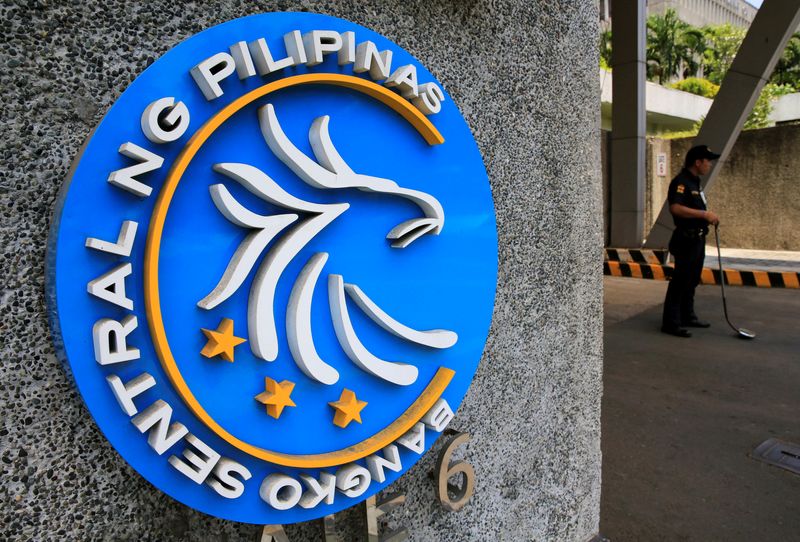Philippine central bank says it’s not yet convinced about downward inflation trend
2023.12.15 06:42
2/2

© Reuters. FILE PHOTO: A security guard stands beside a logo of the Bangko Sentral ng Pilipinas (Central Bank of the Philippines) posted at the main gate in Manila, Philippines April 28, 2016. REUTERS/Romeo Ranoco/File Photo
2/2
By Karen Lema and Neil Jerome Morales
MANILA (Reuters) – The Philippine central bank needs more data to be convinced that the downward trend in inflation will hold before it considers policy easing, its governor said on Friday.
“The data are not so convincing yet about when it is a good time to start easing,” Governor Eli Remolona told CNBC TV.
The Bangko Sentral ng Pilipinas (BSP) kept its benchmark interest rate steady for a second straight meeting at 6.5% on Thursday, and said policy would have to stay “sufficiently tight” to bring inflation back to target.
While inflation eased for a second straight month to 4.1% in November from 4.9% in October and 6.1% in September, Remolona said “we are not so convinced that the trend will hold.”
“We need more data to be convinced that we will be within target by 2024,” Remolona said.
Last month’s inflation outcome, which marked the slowest pace of consumer price increases in 20 months in November, brought the average rate over the 11-month period to 6.2%, which was still well outside the central bank’s 2%-4% target.
“For now we are hawkish,” Remolona said.
Economists in the a Dec. 5-11 Reuters poll believed the central bank was done hiking rates, with median forecasts showing policy on hold until the end of the second quarter of 2024, with the next move likely to be a cut.
Despite a series of rate hikes totaling 450 basis points since May 2022, including two off-cycle rate increases, Remolona said he did not think the central bank had “overstepped in terms of tightening” given that the “economy has remained firm.”
The government announced on Friday it had abandoned next year’s 6.5% to 8.0% GDP growth target range and narrowed it to 6.5% to 7.5%, due in part to the impact of the El Nino weather phenomenon.
It kept its 6.5%-8.0% growth and 2.0%-4.0% inflation targets for 2025-2028.
For 2025, the government said it was proposing a budget of 6.21 trillion pesos ($111.58 billion), equal to 20.5% of gross domestic product, and 6.0% higher than the yet-to-be-signed 5.77 trillion pesos budget bill for 2024 as it aims fund more infrastructure to boost growth.
($1 = 55.6550 Philippine pesos)








